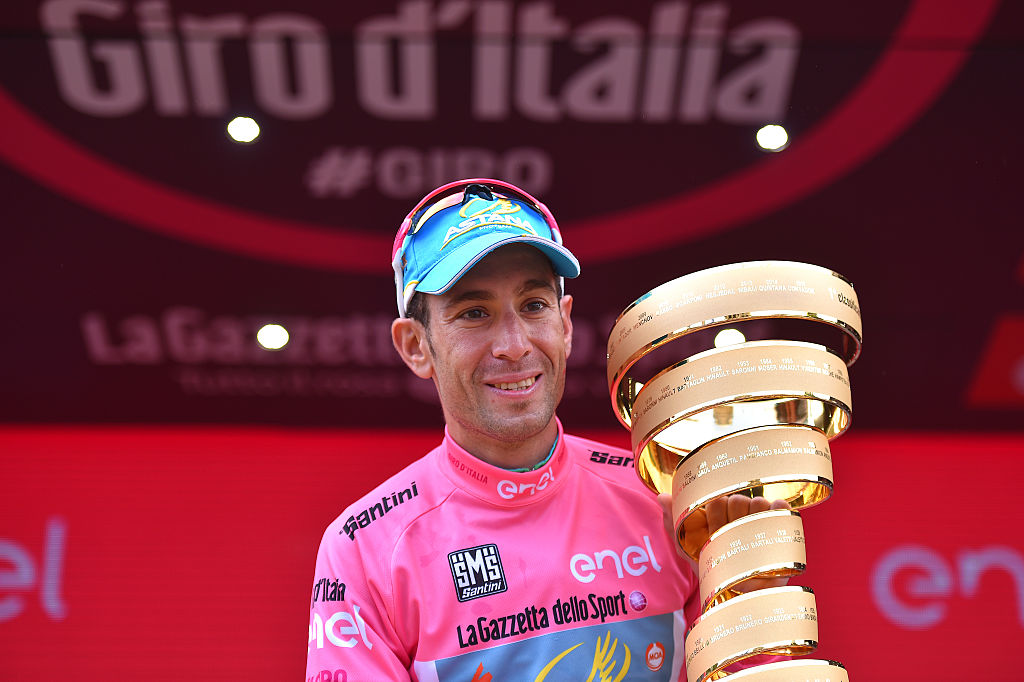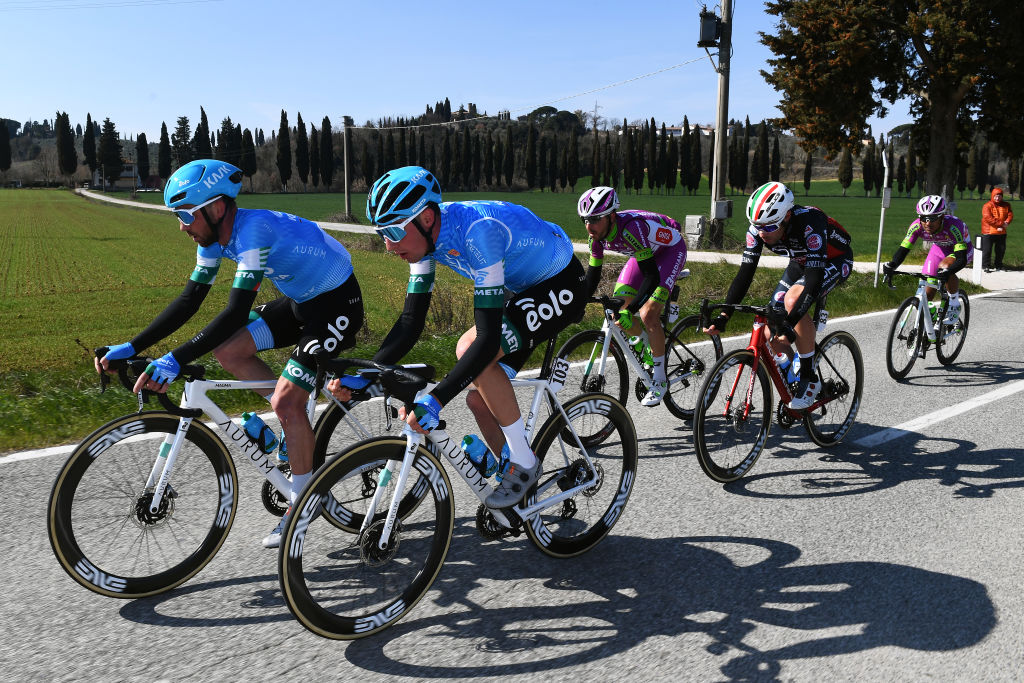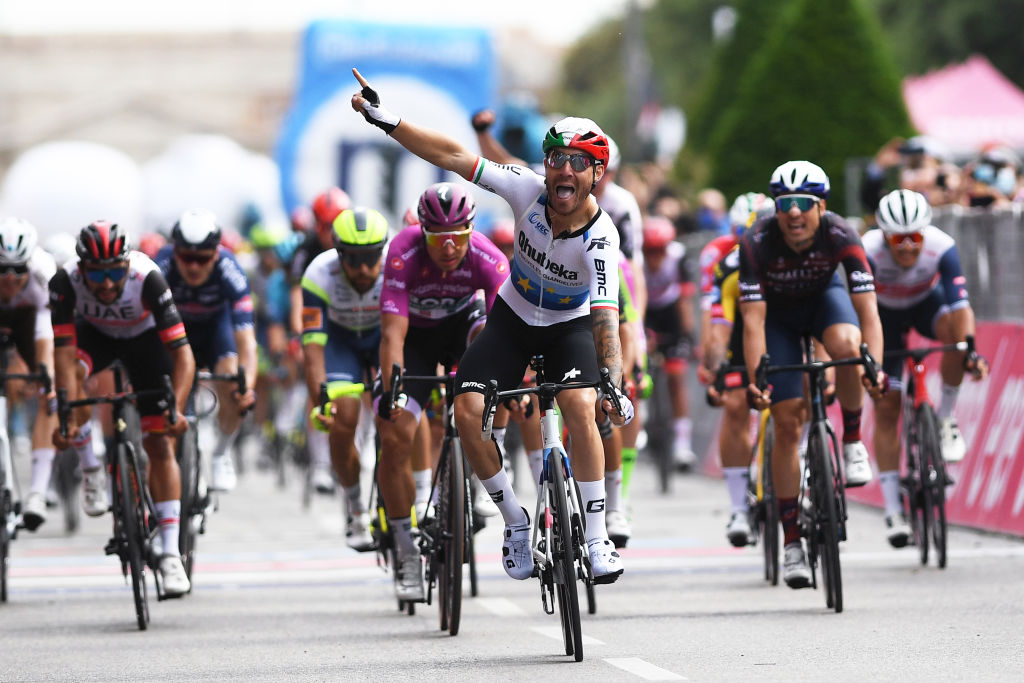More in hope than expectation – The home challenge at the Giro d'Italia
Nibali, Ciccone, and Italy's five-year drought

Only twice before has the home nation known a drought like this one. In the first half of the 1970s and again in the mid-1990s, five successive editions of the Giro d'Italia went by without an Italian winner. Last May, Egan Bernal became the fifth foreign winner in as many years.
Fausto Bertoglio and Ivan Gotti restored Italy to the top of the podium in 1975 and 1997, respectively. Neither man was especially fancied beforehand, but at this juncture, it is difficult to picture an Italian emerging from stage left to don the maglia rosa in the Arena in Verona on May 28. A new record drought seems almost inevitable when the curtain falls on this Giro.
Indeed, were it not for Vincenzo Nibali, winner in 2013 and 2016, Italy would already have gone a full decade without a Giro winner. Then again, the Sicilian's achievements – not just at the Giro, but across the calendar – have papered over some notable cracks in Italian cycling for most of his career.
Angelo Costa of Tuttobici summed up Italian cycling's Nibali-dependency neatly a couple of years ago: "Italy places its hopes in him when he rides the Grand Tours, when he rides the big Classics and when he rides his bike to the supermarket."
Indeed, since the late Michele Scarponi was retroactively awarded the 2011 title, only two Italian riders other than Nibali have even finished on the podium at the Giro: Fabio Aru in 2014 and 2015, and Damiano Caruso last year. Neither Aru, who hung up his wheels last Autumn, nor Caruso, who has been withheld by Bahrain Victorious for the Tour de France, will line out at the Giro this May.
The 37-year-old Nibali is participating in what is likely to be his final Giro, after placing seventh in 2020 and 18th in 2021. While he will look to produce a valedictory cameo here, his Astana Qazaqstan team's general classification challenge is led by Miguel Angel López.
Home hopes will instead be carried by Nibali's former teammate Giulio Ciccone (Trek-Segafredo), but the Abruzzo native is still exploring his potential over three weeks. He looked to be on the right track last year before crashes forced him out of both the Giro and the Vuelta a España, but the leap from climbing in the front group to winning the race outright is surely not yet within his range.
The latest race content, interviews, features, reviews and expert buying guides, direct to your inbox!
WorldTour era

Of course, the paucity of realistic overall contenders from the host nation is simply a function of the scarcity of Italian riders and teams in the race. The provisional start list features just 37 Italian participants (down from 49 last year), while there are only three Italian teams, namely the wildcard invitees Eolo-Kometa, Drone Hopper-Androni Giocattoli and Bardiani-CSF-Faizanè. This year, there wasn't even a polemic over their selection, given that they are the only remaining Italian ProTeams following the demise of Vini Zabù.
The contrast with the Giro of twenty years ago is striking. In 2002, a race utterly overshadowed by doping scandals involving Stefano Garzelli and Gilberto Simoni, ten of the 22 teams were Italian, while there were 84 home riders in the peloton. The race was eventually won by Paolo Savoldelli, who was riding for the modest and short-lived Index-Alexia team, which folded at year's end.
It was a different age. Once the WorldTour era got underway in 2005, Italian participation at the Giro began to decline, as top-flight teams were now compelled to ride all three Grand Tours. The ProTour, as it was then known, featured four Italian teams in its first season, but that number halved at the end of the campaign when both Domina Vacanze and Fassa Bortolo departed the sport. Liquigas and Lampre endured in the WorldTour for a decade or so, but there has been no Italian team in the top flight since the end of 2016, when UAE and Mauro Gianetti took over from Lampre and Giuseppe Saronni.
Further down the pyramid, meanwhile, Italian cycling was perhaps slow to adapt to the new structure. Rather than register as Continental squads, successful amateur teams preferred to remain big fish in the small pond of the Italian domestic scene. At developmental level, the rest of the world began to catch up and then come past.
Even so, there is still a very sizeable Italian presence in the WorldTour. Italian talent and expertise remain firmly in demand, and there are strong contingents of experienced riders, directeurs sportifs and coaches in place at Trek-Segafredo, Ineos Grenadiers, Astana Qazaqstan and Bahrain Victorious, for instance.
However, the lack of a flagship team from a nation with Italy's tradition is a staggering anomaly, the globalisation of cycling and the state of the Italian economy notwithstanding. France and Belgium have three WorldTour teams apiece, after all, while Movistar has endured in Spain and Jumbo-Visma continues to fly the flag in the Netherlands.
In Italy, the fantasy of a new team on the scale of Mapei – who withdrew from cycling after that 2002 Giro – is often evoked, but it has yet to materialise. The latest to try his hand at finding a willing Italian backer is Davide Cassani, though the former national coach envisages that his putative team would begin life at Pro Continental level and seek to grow organically in the manner of Alpecin-Fenix or Arkéa-Samsic.
Cassani finds himself in the position of searching for sponsors after his departure from the Italian Cycling Federation last Autumn. In his primary role as commissario tecnico of the elite men's team, Cassani was not blessed with the charisma or, above all, the rainbow jerseys of Alfredo Martini or Franco Ballerini, but he did the state considerable service with his work as coordinator of Italy's efforts across disciplines and age groups.
Under Cassani's watch, the track and road programmes worked in greater harmony, culminating with the squadra azzurra's gold medal in the team pursuit at the Tokyo Olympics. At first glance, that victory seemed to suggest that Italian cycling was beginning to fulfil the long-trumpeted idea of following the template laid down by British Cycling, though one wonders if the success owed more to a happy confluence of talented and determined individuals than to any particularly joined-up thinking from the upper echelons of the federation.
For part of the Olympic cycle, after all, Filippo Ganna, Elia Viviani et al were unable to train on Italy's only covered track in Montichiari as the leaking roof was being repaired, and the velodrome was closed again for four months last winter for further restructuring. As Italian football also discovered in recent months, one golden summer doesn't suddenly resolve all underlying structural issues.
2022 vision

That said, there are clear green shoots for Italian cycling. After almost two decades of underachievement at under-23 level, Italy has won the past two world titles through Samuele Battistella and Filipo Baroncini.
In the women's WorldTour, Marta Cavalli, Elisa Longo Borghini and world champion Elisa Balsamo have been among the stand-out performers of 2022. Among the elite men, Ganna – an absentee from this year's Giro – is only entering his prime and still exploring his possibilities across a variety of terrains.
And, despite their reduced number, Italian riders will inevitably make an impact at the Giro over the coming three weeks. Davide Formolo, for example, lines up as a wingman for UAE Team Emirates leader João Almeida but with the potential to do so much more.
Lorenzo Fortunato (Eolo-Kometa) will look to replicate the form that carried him to victory on the Zoncolan last year, Giacomo Nizzolo (Israel Premier Tech) will be in the mix in the sprints, and Andrea Bagioli (QuickStep-AlphaVinyl) should catch the eye on his Giro debut.
At the other end of the spectrum, Nibali showed signs of life at the Giro di Sicilia, and he approaches this Giro freed from the burden of riding for the general classification come what may. His contemporary Domenico Pozzovivo could enjoy a last hurrah with Intermarché-Wanty-Gobert.
Ciccone, meanwhile, has been hampered by illness since his last outing at the Volta a Catalunya, but he will still sense possibilities in an open Giro without an outstanding favourite. 16th overall in 2019 was his best finish to date, but stage 9 on home roads will reveal much about his prospects here.
"The stage to the Blockhaus is the one that fascinates me the most," Ciccone told La Gazzetta dello Sport. "It finishes close to home and the route suits me."
The dearth of time trialling kilometres – just 26 in total, the lowest since 1962 – will also be to Ciccone's liking. "We're coming with an attacking team," he said. Italian expectations may be lower than normal, but hope endures.

Barry Ryan was Head of Features at Cyclingnews. He has covered professional cycling since 2010, reporting from the Tour de France, Giro d’Italia and events from Argentina to Japan. His writing has appeared in The Independent, Procycling and Cycling Plus. He is the author of The Ascent: Sean Kelly, Stephen Roche and the Rise of Irish Cycling’s Golden Generation, published by Gill Books.